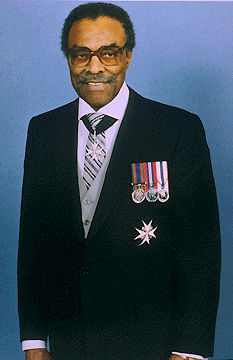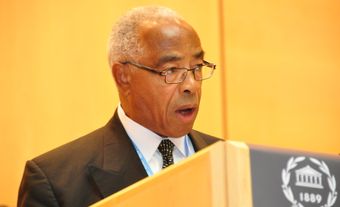
Early Life and Service
Lincoln Alexander was the oldest son of Caribbean immigrant parents. His mother, Mae Rose, was from Jamaica and his father, Lincoln, from St. Vincent and the Grenadines. At the time, job opportunities were limited for Black Canadians. Though his father was a carpenter by trade, he worked as a sleeping car porter for the Canadian Pacific Railway. His mother worked as a maid.
After his mother and father separated when he was a teenager, Alexander lived with his mother in Harlem, New York City, for a few years. It was in Harlem that Alexander encountered role models with greater positions than those available to Black men in Canada. He later wrote that this experience in Harlem “stiffened my resolve to be more than a porter.”
He returned to Toronto in 1939, shortly after the start of the Second World War. Though he was too young to enlist, he worked as a machinist at a factory in Hamilton, making anti-aircraft guns for the war effort.
In 1942, Alexander joined the Royal Canadian Air Force (RCAF), a branch of the armed forces that often restricted non-Whites from entering service. Because Alexander had poor eyesight, he was not eligible for combat. He trained instead as a wireless operator, and served with the British Commonwealth Air Training Plan in Portage la Prairie, Manitoba. When he was honourably discharged in 1945, he held the rank of corporal.
Law and Politics
After the Second World War, Lincoln Alexander turned to higher education. He earned a BA from McMaster University in 1949, followed by a degree from Osgoode Hall Law School in 1953 (see Osgoode Hall). Alexander first practised law at a small firm in Hamilton before starting his own firm. In 1965, he was appointed Queen’s Counsel, an honorary title that recognizes a lawyer’s contribution to the legal profession.
Alexander’s ambitions began to shift from law to politics. In his memoir, Go to School, You’re a Little Black Boy (2006), Alexander mentions a 1960 tour through some 23 African nations that had significant impact on his point of view:
“The experience was an eye-opener for me, not only as a lawyer, but also as a human being, because I began to realize what Black people could do. I saw that, unlike the Hollywood version, these Africans were men and women of significant talents. I became conscious of my Blackness. I had come from a White world. Now we were in Africa, and I realized we are people of skill and creativity. I was a Black man and I was a somebody. I started standing tall.”
In 1965, Alexander entered politics, running as Conservative member of Parliament (MP) for Hamilton West, but was defeated by less than 2,500 votes. Three years later, on 25 June 1968, he won the seat, making him the first Black Canadian to sit in the House of Commons. In his first speech before the House on 20 September 1968, he said:
“I am not the spokesman for the Negro; that honour has not been given to me. Do not let me ever give anyone that impression. However, I want the record to show that I accept the responsibility of speaking for him and all others in this great nation who feel that they are the subjects of discrimination because of race, creed or colour.”
He was re-elected four times, serving a total of 12 years.
One of many memorable moments during Alexander’s time in the House of Commons occurred in February 1971. Alexander and Newfoundland MP John Lundrigan alleged that Prime Minister Pierre Trudeau had mouthed the words f--- off to them during Question Period. Trudeau famously denied swearing in the House, claiming instead that he had mouthed “fuddle duddle.” In his 2006 memoir, Alexander was adamant, “He definitely told us to f--- off.”
In 1979, Alexander was appointed minister of labour in the Joe Clark government, becoming the first Black Canadian to serve in Cabinet. In 1980, he resigned his seat when Ontario Premier Bill Davis appointed him chair of the Ontario Workers’ Compensation Board, where he served for five years (see Workers’ Compensation).
Lieutenant-Governor
On 20 September 1985, Lincoln Alexander was sworn in as Ontario’s 24th lieutenant-governor, the first Black Canadian to be appointed to a viceregal position in Canada (see Lieutenant-Governors of Ontario). As lieutenant-governor, Alexander was able to take an active role in the multicultural affairs of Ontario. Alexander’s mandate was to fight racism, advance the cause of youth and advocate for seniors.
In 1991, when his term of office was up, Alexander accepted a post as chancellor of the University of Guelph, where he served an unprecedented five terms. After he was succeeded by Pamela Wallin in 2007, he was named chancellor emeritus.
In 2000, Alexander was appointed chair of the Canadian Race Relations Foundation, an organization dedicated to ending racism and racial discrimination in Canada.
Personal Life
Lincoln Alexander married Yvonne Harrison in 1948. Yvonne was the daughter of Robert Harrison, a railway porter, and Edythe (née Lewis). The Alexanders’ only child, Keith, was born in 1949. After suffering for several years from Alzheimer’s disease, Yvonne passed away in 1999. Many years later, Alexander met Marni Beal. The couple married in 2011.
Legacy
Lincoln Alexander died in his sleep on 19 October 2012. He was known for his sound judgement, compassion and humanity. Schools were named after him in Hamilton (1989), Ajax (1992) and Mississauga (2000) as well as an expressway in Hamilton, commonly called “the Linc” in reference to Alexander’s nickname (1997).
On 28 November 2013, the Legislative Assembly of Ontario declared 21 January of each year Lincoln Alexander Day, citing Alexander’s life as “an example of service, determination and humility. Always fighting for equal rights for all races in our society, and doing so without malice, he changed attitudes and contributed greatly to the inclusiveness and tolerance of Canada today.” On 21 January 2015, Lincoln Alexander Day was observed across Canada for the first time.
In January 2024, a bust of Alexander, designed by artist Quentin VerCetty, was unveiled at Queen's Park.

Honours and Awards
Lincoln Alexander received honorary degrees from six Canadian universities — Toronto (1986), McMaster (1987), Western (1988), York (1990), Royal Military College (1991) and Queen’s (1992) — and was bestowed with several awards, including:
- Cultural Achievement Award, Caribana Cultural Committee (1984)
- Member of the Order of Ontario (1992)
- Companion of the Order of Canada (1992)
- Canadian Forces Decoration (1994)
- Lifetime Achievement Award, Canadian Association of Black Lawyers (1997)
- Lifetime Achievement, Harry Jerome Awards (2001)
- Queen Elizabeth II’s Golden Jubilee Medal (2002)
- Queen Elizabeth II’s Diamond Jubilee Medal (2012)

 Share on Facebook
Share on Facebook Share on X
Share on X Share by Email
Share by Email Share on Google Classroom
Share on Google Classroom
